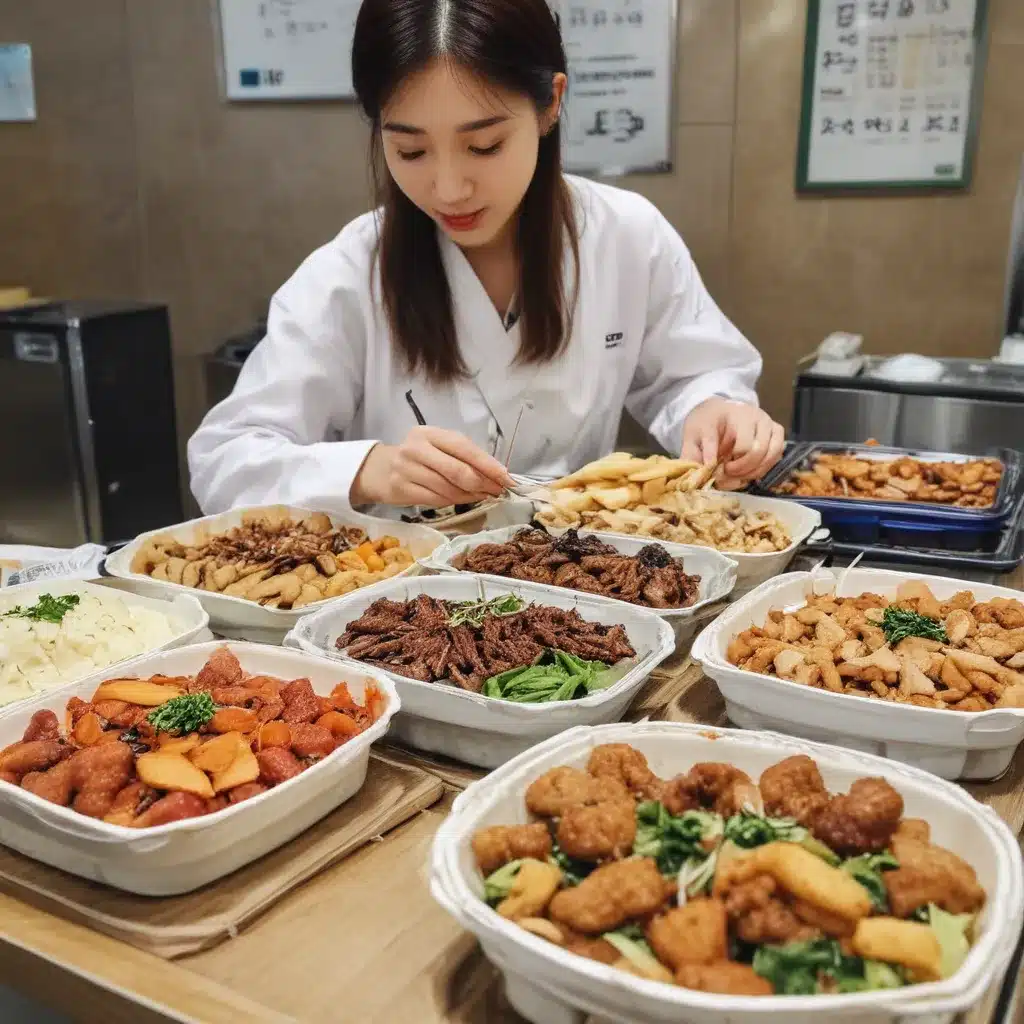
Uncovering the Hidden Gems of Korean Cuisine in Boston
As a self-proclaimed foodie and avid traveler, I’ve always been fascinated by the rich and vibrant culinary landscape of Korea. The bold flavors, the intricate techniques, and the deep cultural traditions that underpin each dish – it’s a symphony for the senses that I’ve been longing to experience. But, alas, the high cost of international airfare and the lingering effects of a global pandemic have kept me firmly grounded on this side of the Pacific.
Or have they? You see, I recently discovered that the city of Boston is teeming with hidden gems when it comes to authentic Korean cuisine. From the bustling neighborhoods of Allston and Chinatown to the quiet enclaves of Brookline and Cambridge, the flavors of the Korean peninsula are alive and well, just waiting to be unearthed. And let me tell you, these local restaurants and eateries are about to transport your tastebuds on a culinary journey that will rival any trip to Seoul.
Navigating the Diverse Flavors of Korean Cuisine in Boston
One of the things that has always captivated me about Korean food is its sheer diversity. It’s not just kimchi and bulgogi, though those staples certainly hold a revered place at the table. No, Korean cuisine is a tapestry of regional specialties, family recipes, and innovative twists that span the entire spectrum of savory, sweet, spicy, and umami.
Take, for instance, the vibrant and dynamic cuisine of the Gangwon-do province, nestled along the eastern coast of the Korean peninsula. Here, you’ll find hearty dishes like makgeolli-marinated grilled mackerel, fragrant jeon (savory pancakes) made with freshly foraged greens, and the iconic dakgalbi – a fiery stir-fry of chicken, cabbage, and sweet-and-spicy gochujang sauce. And the best part? You don’t have to travel all the way to Gangwon-do to experience these flavors.
“I was blown away the first time I tried dakgalbi at a little hole-in-the-wall spot in Allston,” recounts Sarah, a local Bostonian and self-proclaimed Korean food aficionado. “The way the smoky char of the chicken mingled with the punchy gochujang and the crunch of the cabbage – it was like a flavor explosion in my mouth. I felt like I had been transported straight to the streets of Chuncheon.”
But regional specialties are just the tip of the iceberg when it comes to the diversity of Korean cuisine in Boston. You’ll also find delectable dishes that draw inspiration from the royal court traditions of the Joseon dynasty, such as the meticulously prepared bibimbap, or the elegant, jewel-toned japchae noodles. And let’s not forget the beloved street food favorites, like the crispy, golden-brown tornado potato or the impossibly fluffy, sugar-dusted hotteok pancakes.
Unearthing the Hidden Gems: A Culinary Treasure Hunt in Boston
As exciting as all of these flavors may sound, the true thrill of exploring Korean cuisine in Boston lies in the act of discovery. You see, unlike other major cities with their well-established “Koreatown” districts, the Korean food scene in Boston is a bit more… elusive. It requires a certain level of culinary adventurousness and a willingness to veer off the beaten path.
But trust me, the rewards are more than worth it. Take, for example, the unassuming storefront of Korean Garden in Allston. From the outside, it may look like just another nondescript Asian eatery, but step inside and you’ll be transported to a bustling, family-owned operation that serves up some of the most authentic and delectable Korean fare in the city.
“We take great pride in using only the freshest, highest-quality ingredients in our dishes,” explains Soo-Jin, the owner of Korean Garden. “And we’ve worked hard to preserve the traditional cooking methods and flavors that have been passed down through generations in our family. For us, it’s not just about serving food – it’s about sharing a piece of our culture and our heritage.”
And Korean Garden is just the tip of the iceberg. Scattered throughout Boston’s diverse neighborhoods, you’ll find a treasure trove of hidden gems – from the cozy, mom-and-pop-style grill houses of Brookline to the contemporary, fusion-inspired eateries of the South End. Each one offering a unique window into the rich tapestry of Korean cuisine.
Embracing the Art of Korean Banchan
Of course, no exploration of Korean cuisine would be complete without delving into the world of banchan – those small, flavorful side dishes that are an integral part of any traditional Korean meal. These bite-sized marvels are more than just culinary accompaniments; they’re a reflection of the deep reverence for balance, texture, and seasonal ingredients that underpins Korean culinary tradition.
“Banchan are like the supporting actors in a blockbuster film,” muses Sarah, the local Korean food enthusiast. “They may not be the main attraction, but they play a crucial role in elevating the overall experience. Each one brings its own unique flavor profile and textural contrast, creating a harmonious symphony on the palate.”
At the best Korean restaurants in Boston, you’ll be treated to an ever-changing array of banchan, each one more delectable than the last. Perhaps you’ll savor the earthy, umami-rich flavors of sautéed mushrooms one day, and the next you’ll be captivated by the bright, refreshing crunch of pickled radish. It’s a culinary adventure that never gets old, a constant exploration of the nuances and complexities that define Korean cuisine.
Unlocking the Secrets of Korean Cooking Techniques
But what truly sets Korean cuisine apart, in my opinion, is the sheer level of skill and artistry that goes into each dish. From the meticulous preparation of the ingredients to the precise control of heat and timing, there’s a level of mastery at play that can’t help but inspire awe.
Take, for instance, the art of Korean barbecue. At the best Korean BBQ spots in Boston, you’ll witness a carefully choreographed dance as the skilled chefs expertly grill and slice the marinated meats, ensuring each bite is perfectly caramelized and infused with a smoky, umami-rich flavor. And let’s not forget the banchan that accompany the feast – meticulously chopped, seasoned, and arranged to create a visual and gustatory masterpiece.
“When I first tried Korean barbecue, I was completely mesmerized by the entire process,” recalls Sarah. “The way the chef would deftly handle the grill, adjusting the temperature and the placement of the meat with such precision – it was like watching a skilled artist at work. And then, when that first bite hit my tongue, it was like a revelation. The layers of flavor, the interplay of textures – it was a culinary experience unlike anything I’d ever had.”
But it’s not just the barbecue that showcases the mastery of Korean cooking techniques. From the delicate, lacy craftsmanship of the jeon pancakes to the painstaking preparation of the kimchi – every element of Korean cuisine is imbued with a level of care and attention to detail that is truly awe-inspiring.
Discovering the Heart and Soul of Korean Culture Through Food
As I’ve delved deeper into the world of Korean cuisine in Boston, I’ve come to realize that it’s not just about the food itself. It’s about so much more – it’s about uncovering the rich cultural traditions, the stories, and the deep sense of community that are woven into every bite.
“When you sit down to a traditional Korean meal, you’re not just eating – you’re experiencing a living, breathing piece of Korean history and heritage,” explains Soo-Jin, the owner of Korean Garden. “Each dish, each flavor, each technique – it all has a story behind it, a legacy that has been passed down through generations. And for us, sharing that story is just as important as serving up delicious food.”
At places like Korean Garden, I’ve had the privilege of not just savoring the flavors of Korea, but of engaging in the vibrant, lively culture that surrounds it. I’ve listened raptly as the owners have regaled me with tales of their family’s culinary traditions, of the rituals and celebrations that are woven into the fabric of Korean society. And in doing so, I’ve gained a deeper appreciation for the rich tapestry of Korean identity, and the ways in which food serves as a powerful conduit for cultural expression.
Embracing the Joy of Shared Experiences
But perhaps the most rewarding aspect of exploring Korean cuisine in Boston has been the sense of community and shared joy that it fosters. Whether I’m sipping on a refreshing glass of makgeolli at a lively neighborhood eatery or savoring the flavors of a meticulously prepared bibimbap, I’ve been struck by the way that food has the power to bring people together, to transcend language and cultural barriers, and to create a sense of belonging.
“There’s something about Korean food that just has a way of bringing people together,” muses Sarah. “Maybe it’s the convivial nature of shared plates and communal dining, or the way the flavors seem to just resonate with everyone who tries them. But whatever it is, it creates this incredible sense of camaraderie and shared experience that I haven’t really found in any other cuisine.”
And it’s not just the local Korean community that is embracing this culinary revolution in Boston. I’ve witnessed diners of all backgrounds – from lifelong Bostonians to recent transplants – coming together to celebrate the unique and vibrant flavors of Korea. It’s a testament to the enduring power of food to connect us, to foster understanding, and to create a sense of community in even the most unexpected of places.
Conclusion: Embarking on a Culinary Journey to Korea (Without Leaving Boston)
As I reflect on my culinary adventures in Boston’s Korean food scene, I can’t help but feel a deep sense of gratitude and awe. What began as a simple quest to satisfy my cravings for authentic Korean cuisine has blossomed into a rich, multi-layered exploration of culture, community, and the power of food to transcend borders and bring people together.
Whether you’re a seasoned Korean food aficionado or a newcomer to the cuisine, Boston’s hidden gems are waiting to transport your tastebuds on a journey to the vibrant, dynamic flavors of the Korean peninsula. So what are you waiting for? Grab a fork and embark on your own culinary adventure – the flavors of Korea are just a short trip away.
